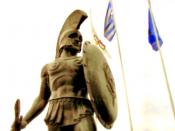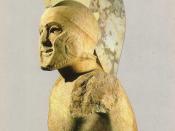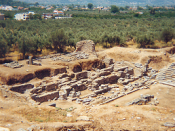The defeat of Persia in 479 BC could arguably be much attributed to Spartan leadership. However, it is vital to note that such leadership was not solely responsible for Greek triumph, nor was it immune to problems and limitations.
Sparta's leadership could easily be said to have had a large impact on the war against Persia. According to Hammond, "The nucleus of power around which [the Greek congress] was built was the Spartan alliance...".
Sparta could be seen to be the natural leader in the Greek effort against Xerxes for several reasons, first of which being that Sparta was recognized throughout Greece as having the best infantrymen, which gave them an advantage over Athens due to the idea that "military power had always counted for more than naval power." --Hammond.
Furthermore, Sparta was known for her strong anti-Persian sentiments. Sparta was also able to contribute significantly in terms of strategies and organizational skills.
Sparta can be seen to be a central figure for the Greek states, able to act not only as head of the Greek League but also as a source for morale and confidence - as Meier put it, "Furthermore, [Sparta] considered themselves invincible; and their allies on the Peloponnese - no matter what they thought - had little choice but to follow their example.".
Sparta's leaders were of significance as well. Pausanias defeated the Persian cavalry at Plataea, displaying brilliant leadership and cleverness. Herodotus praises Pausanias as "flawless".
The success of Sparta's leadership must be viewed in the context of its limitations. Sparta was well reputed for her reluctance to leave home and go north of the isthmus, and so some states were hesitant to join the League with the knowledge that such unreliability was as its head.
Sparta was also a highly religious state. Their refusal to cut short a religious festival affected the battles at both Marathon and Thermopylae.
Modern historian Meir points out that Sparta was also very clumsy with the Greek navy, demonstrated by their willingness to fight the Persian fleet in open waters, which would exacerbate their vulnerability due to such a drastic difference in numbers.
Spartan leadership is not the only factor affecting the victory of the Greeks against the Persians. The Persian army made a number of errors during their bouts with Greece. According to Hignett, the Persians never changed their battle strategies while fighting the Greeks, and thus they constantly fell victim to the Greek strategy of fighting in small, narrow places, which essentially made Persia's largeness of army irrelevant. Unable to utilize their size, Persia was forced to fight on more equitable ground, which placed them under threat of Greece's superior weaponry and battle technique.
In addition to the mistakes made by the Persians, there were contributing factors that lay not in Spartan leadership but in Greek unity and its structure.
It is possible to conclude that Spartan leadership was indeed a large factor in the defeat of Xerxes by the Greeks in 479 BC; however, limitations and other factors must also be considered when looking at the whole picture.


